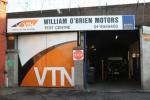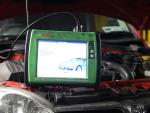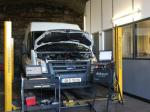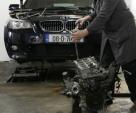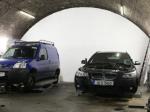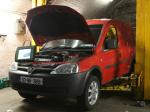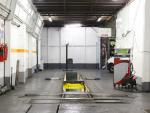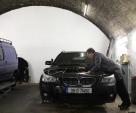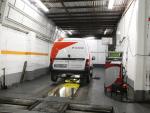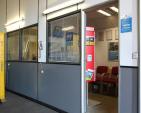William O'Brien Motors ,
Unit G1, Croke Park Industrial Estate ,
Portland Street North ,
Dublin 1,
Tel: 01- 855 5403 or 01- 855 5513
Website: www.williamobrienmotors.com
no offers added
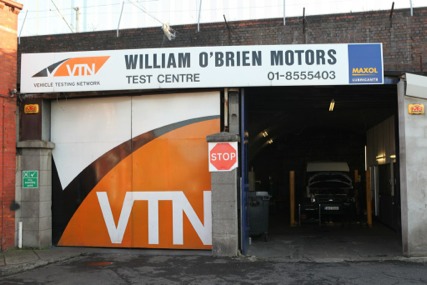
Vehicle Service and Diagnostic Centre
- Pre-NCT Service
- Computerised Diagnostics for most marques
- General car repairs and servicing
- Sensor Fault Codes
- ABS faults
- Clutch Repair
- Radiator faults
- Water Pumps
- Alternator Repair
- Fan Belt Repair
- Brakes and Exhaust
- Full Crash Repair Service (technical, panel beating and spraying)
- Car Body Repairs
- Light Commercial (LGV) / Van Testing
- Commercial vehicle test centre (part of the Vehicle Testing Network)
- DOE / VTN approved van test centre conveniently located in Dublin 1.
Q. What are the biggest changes you've seen in cars over the last 30 years?
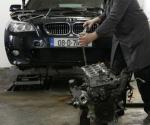 A. The biggest change has been the electronics that have been put in cars. We have gone from the basic engine where you have an ignition key, a coil and a distributor to sophisticated electronically controlled engines. For example, all modern cars have engine management systems to maximise efficiency. Instead of having the old fashioned distributor driven mechanically off the engine, sensors are now used.
A. The biggest change has been the electronics that have been put in cars. We have gone from the basic engine where you have an ignition key, a coil and a distributor to sophisticated electronically controlled engines. For example, all modern cars have engine management systems to maximise efficiency. Instead of having the old fashioned distributor driven mechanically off the engine, sensors are now used.
Sensors send signals from the various engine components to the ECU, and the processor within the ECU decides on ignition advance, fuel advance and fuel mixture ratios. This makes your car more efficient in terms of starting, fuel economy and also in terms of exhaust emissions. Twenty years ago, average C02 emissions would have been between 2 to 4.5. Today, they are legally required to be zero + or - 0.03
[In the 1970's, if a car broke down, you could have put a screwdriver in your pocket and probably nine times out of ten, you could make a small adjustment on the ignition points or something of that nature and get the car started]
In the 1970's, if a car broke down, you could have put a screwdriver in your pocket and probably nine times out of ten, you could make a small adjustment on the ignition points or something of that nature and get the car started. Nowadays it is pointless going out to look at a car at the side of the road because the first thing you have to do is plug in a computer to read what the diagnostics fault codes are. Then you have to do an assessment of the various different sensors and actuators and maybe replace some of them. The way modern car engines are fitted makes it is practically impossible to do that kind of work on a roadside.
Q. Do a lot of people phone you from the side of the road requiring help?
A. Most people have some sort of breakdown cover on their insurance so normally the first port of call for them is to phone their insurance company whether that is AXA, Aviva or whoever has covered them. The insurance company will send out their technicians to have a look at it. If it?s a flat battery or lack of petrol, they will fix it at the side of the road, otherwise they will tow it to a garage of the vehicle owner?s choice.
Q. Twenty years ago, a lot of people would have serviced their own car. Can the average DIY-er service modern cars?
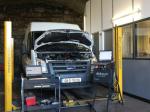 A. It really depends on what you term "a service". When most lay people talk about a service, they usually mean changing the oil, the oil filter and maybe the air filter. Anybody can do that at the side of the road, but that doesn't necessarily cover components in your car that are prone to wear and tear or car's safety features. In Dublin, in a lot of places, as soon as you go off the main roads, for example in housing or industrial estates, you're driving over ramps and your suspension is being hammered. It is essential that your car gets a proper service from a garage with proper diagnostic equipment and methods of examining the vehicle wheels free. Some components on a vehicle such as wheel bearings, ball joints, anti-roll bars and link-arms and most importantly brake lines and hoses can only be inspected when the vehicle is put up on a proper lift. So, there is a big difference between a "a service" done on somebody's driveway and a service carried out in a fully equipped garage.
A. It really depends on what you term "a service". When most lay people talk about a service, they usually mean changing the oil, the oil filter and maybe the air filter. Anybody can do that at the side of the road, but that doesn't necessarily cover components in your car that are prone to wear and tear or car's safety features. In Dublin, in a lot of places, as soon as you go off the main roads, for example in housing or industrial estates, you're driving over ramps and your suspension is being hammered. It is essential that your car gets a proper service from a garage with proper diagnostic equipment and methods of examining the vehicle wheels free. Some components on a vehicle such as wheel bearings, ball joints, anti-roll bars and link-arms and most importantly brake lines and hoses can only be inspected when the vehicle is put up on a proper lift. So, there is a big difference between a "a service" done on somebody's driveway and a service carried out in a fully equipped garage.
Q. So do you get many people who have tried to fix or service their car themselves and get stuck half-way?
A. Yeah sure, you'll always have someone who tries to change their own oil but can't get the oil filter off or damages the casing of the oil filter. Or you might have someone who doesn?t fit the oil filter correctly by not re-fitting the sump plug correctly, drives away, tops it up with oil and all of a sudden you have an oil leak and end up with some engine damage. Other than that, you can get DIY-ers who damage the plastic fittings around the engine, vacuum pipes or sensors simply by leaning on them or using undue force trying to remove them. Then they notice their car running very poorly after their "service"!
Q. Diesel engines have never been so popular in Ireland. What are the reasons behind this?
A. Well on modern diesel engines the fuel efficiency has greatly increased where they have changed from old fashioned injection methods to high pressure injection methods. The cost of diesel is cheaper and the emissions from diesel engines have been greatly reduced.
Q. So is there any reason somebody should buy a petrol car anymore?
A. Petrol cars are as efficient as ever, deciding on a petrol or diesel engine really depends on the mileage you are doing. If you?re doing an average 5000 miles a year, there is no benefit in having a diesel car. Diesel engines do not like slow speeds and short distances. They are built to drive, to pull loads. For example, if you have a diesel car that is just used for short shopping trips, then the soot content builds up in the exhaust and can create problems with engine management system which leads to your orange engine management light coming on.
Q. It seems with modern cars the engine light seems to be a key indicator that something is wrong or the car needs a service?
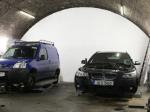 A. The engine light does not necessarily mean it is time for your car to be serviced. Of course, there are exceptions, for example when people don?t change their oil in their vehicle regularly. It can be one of the reasons why greater carbon content is built up in the engine causing sensor or actuator failure bringing the engine management light on. Oil lubricates your engine but also acts as a cleaner and takes away the unburnt fuel particles from within the cylinder. So if oil is not changed on a regular basis, it tends to carbon up and can assist in createing excessive emissions. The engine management light is basically a control to monitor the emissions of a car. The basic thing to remember is that when a car is built, the parameters which the ECU are set to control the emissions to a certain level. During the lifecycle of the car, the ECU adjusts the parameters to compensate for wear and tear in the engine?s components and achieves that by measuring the content of the oxygen in the exhaust system by the use of oxygen sensors in the front and rear of the catalytic converter. A lot of the time, when the engine management light comes on, there is a difference in the oxygen content in the exhaust outside the parameters set in the ECU.
A. The engine light does not necessarily mean it is time for your car to be serviced. Of course, there are exceptions, for example when people don?t change their oil in their vehicle regularly. It can be one of the reasons why greater carbon content is built up in the engine causing sensor or actuator failure bringing the engine management light on. Oil lubricates your engine but also acts as a cleaner and takes away the unburnt fuel particles from within the cylinder. So if oil is not changed on a regular basis, it tends to carbon up and can assist in createing excessive emissions. The engine management light is basically a control to monitor the emissions of a car. The basic thing to remember is that when a car is built, the parameters which the ECU are set to control the emissions to a certain level. During the lifecycle of the car, the ECU adjusts the parameters to compensate for wear and tear in the engine?s components and achieves that by measuring the content of the oxygen in the exhaust system by the use of oxygen sensors in the front and rear of the catalytic converter. A lot of the time, when the engine management light comes on, there is a difference in the oxygen content in the exhaust outside the parameters set in the ECU.
Q. One of your specialisations at William O?Brien motors is the carrying out of the Road Safety Authority's Road Worthiness Test. What are the most common things people fail on?
A. The most common reasons for failure are lights, wipers and tyres. After that, steering joints and ball joints are common reasons for failure because of all the speed ramps and potholes. Modern ball joints don't have grease nipples, they are mainly steel joints with plastic encased around them, so they can suffer a tremendous amount of wear. Failure for flexible brake hoses is also a common failure. In order for brake fluid to be distributed from the main body of the vehicle out to the wheels, flexible brake hoses are needed. These can suffer fatigue due to the constant turning of the wheels and can chaff and split.
Q. What is the main equipment you use for the testing of cars and vans?
A. Some of the equipment we would use would include a side slip machine which checks to see if the steering track is correct. To test the condition of the shock absorbers, we would use a suspension tester. We would use a rolling road brake tester to electronically test the braking efficiency. Shaker plates are used to test the suspension. In order to test the headlights we would use what is known as a headlight beamsetter and to test exhaust emissions a gas analysis tester is used.
In terms of the vehicle?s computer and electronics, we use diagnostic equipment specific to the marque.
Q. Can you tell us what type of diagnostic equipment you would use for the vehicles onboard computer and electronics?
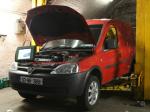 A. Well, it depends on the brand of the car. For general European marques of car, we use Bosch diagnostic equipment. For Asian marques we generally use Carman diagnostics and for French marques of van or car we use Sagem equipment. We also use dealer level specific brands for Ford, Mazda, Landrover, Jaguar, Mercedes, Renault and VW, This equipment would be the same type that the main dealer garages would use.
A. Well, it depends on the brand of the car. For general European marques of car, we use Bosch diagnostic equipment. For Asian marques we generally use Carman diagnostics and for French marques of van or car we use Sagem equipment. We also use dealer level specific brands for Ford, Mazda, Landrover, Jaguar, Mercedes, Renault and VW, This equipment would be the same type that the main dealer garages would use.
Q. Is the Pre-NCT test similar?
A. Yes, we would be testing similar components like suspension, headlights and exhausts.
Q. A well serviced fleet of vans will be more economical to a business in the long run rather than breaking down at the side of the road?
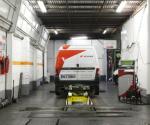 A. Yes, breaking down can be expensive! The first thing you have to do is tow the vehicle away. Then you incur the downtime of the driver sitting there with the van, so breaking down can be expensive, there is no doubt about that. Servicing a vehicle can make sure the engine is well lubricated but can also highlight issues that might be a problem in the future. A repair can be carried out before it leads to a side-of-the-road breakdown situation.
A. Yes, breaking down can be expensive! The first thing you have to do is tow the vehicle away. Then you incur the downtime of the driver sitting there with the van, so breaking down can be expensive, there is no doubt about that. Servicing a vehicle can make sure the engine is well lubricated but can also highlight issues that might be a problem in the future. A repair can be carried out before it leads to a side-of-the-road breakdown situation.
Q. What are some of the misconceptions people have about independent garages?
A. The main issue that affects independent garages is consumer confidence. The vehicle owner needs confidence in the garage that they will provide a professional service, an honest appraisal of what is wrong with the vehicle, and an honest assessment of what the repair is going to cost. A car or van can be an expensive purchase. A lot of people are not prepared to hand it over to an unknown garage to fix it without having some form of referral from a family member, friend or business acquaintance.

